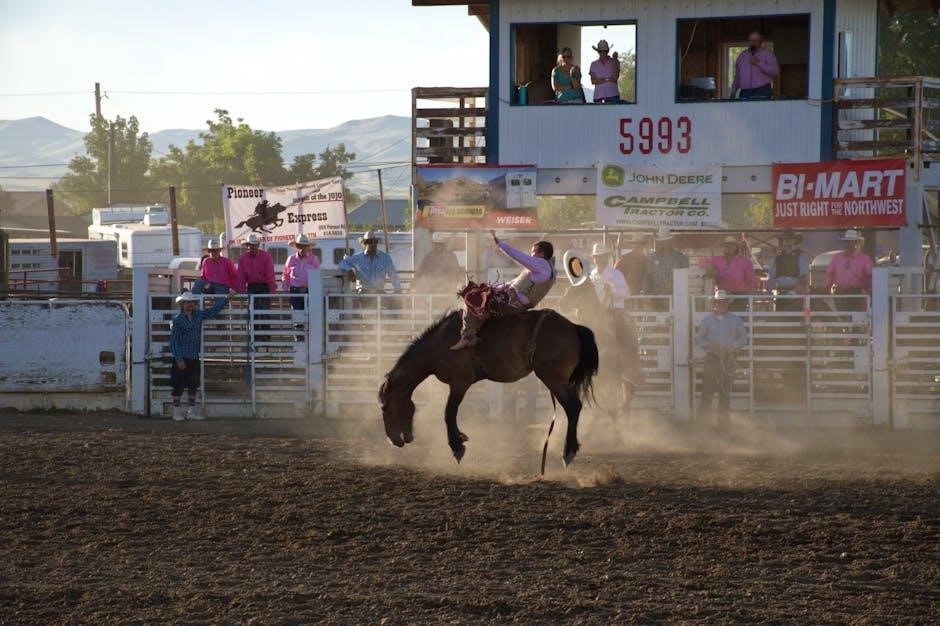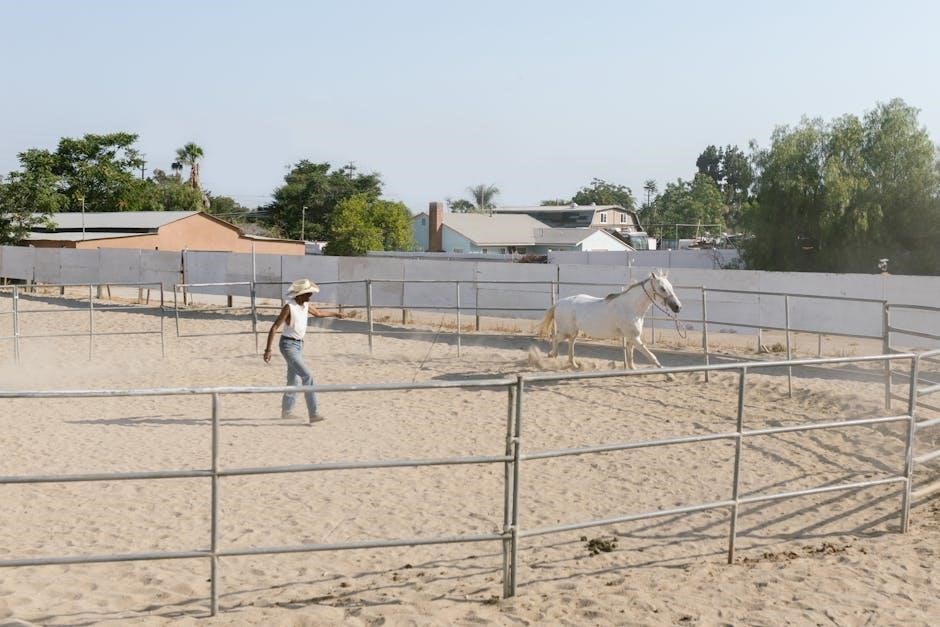The Man in the Arena PDF: An Overview
Theodore Roosevelt’s iconic speech, delivered in 1910, emphasizes courage and action over criticism. The Man in the Arena PDF highlights the importance of perseverance and civic duty, inspiring individuals to engage actively in society. It remains a powerful call to action, resonating with its timeless message.

Theodore Roosevelt’s The Man in the Arena is a powerful excerpt from his 1910 speech, Citizenship in a Republic, delivered at the Sorbonne in Paris. The speech emphasizes the importance of active participation in civic life and the value of courage over criticism. Roosevelt famously declares that “it is not the critic who counts” but rather the individual who dares to act, even in the face of failure. This iconic message has resonated globally, inspiring individuals to embrace challenge and responsibility. The speech’s central theme of perseverance and civic duty continues to be relevant, making it a timeless piece of motivational literature.
Background of the Speech
Theodore Roosevelt delivered The Man in the Arena on April 23, 1910, at the Sorbonne in Paris. The speech, part of his Citizenship in a Republic address, emphasizes civic responsibility and the importance of action over criticism, reflecting Roosevelt’s belief in active citizenship and moral courage.
The Sorbonne, Paris, and the Date of Delivery
Theodore Roosevelt delivered The Man in the Arena speech on April 23, 1910, at the prestigious Sorbonne in Paris, France. This historic location, renowned for its academic and cultural significance, provided a fitting platform for Roosevelt’s address. The speech was part of a broader series of lectures he gave during his European tour, emphasizing themes of citizenship and moral responsibility. The Sorbonne’s esteemed audience included scholars, intellectuals, and civic leaders, aligning perfectly with Roosevelt’s message of active engagement in society. The date and venue underscore the speech’s importance, as it was a pivotal moment in Roosevelt’s efforts to inspire global leadership and civic participation.
Significance of the Speech in Historical Context
The Man in the Arena speech holds profound historical significance, delivered during a period of global transformation. Roosevelt’s address in 1910 coincided with the rise of industrialization and shifting political landscapes, making his call for civic engagement and moral courage particularly relevant. The speech not only reflected Roosevelt’s progressive ideals but also served as a rallying cry for individuals to take an active role in shaping their societies. Its emphasis on overcoming criticism and striving for excellence resonated deeply, making it a cornerstone of motivational literature. Historically, it marked a pivotal moment in Roosevelt’s career, solidifying his reputation as a thought leader and inspiring future generations to embrace civic responsibility and leadership.

Key Themes of The Man in the Arena
The speech centers on courage, action, and civic responsibility, contrasting the critic with the doer. It emphasizes moral integrity and perseverance in the face of adversity.

The Concept of the “Man in the Arena”
The “Man in the Arena” symbolizes individuals who actively engage in life’s challenges, embracing risks and failures. Roosevelt contrasts them with critics who remain passive. This concept underscores the value of courage, effort, and resilience, urging individuals to participate fully in civic and personal endeavors. By focusing on the doer rather than the spectator, the speech inspires a mindset of proactive engagement and moral responsibility, highlighting the importance of striving for a noble cause despite potential setbacks.
The Role of the Critic vs. the Doer
Roosevelt’s speech vividly contrasts the critic, who passively judges, with the doer, who actively participates in life’s challenges. The critic, often detached and uninvolved, may point out flaws but lacks the courage to act. In contrast, the doer, though imperfect and vulnerable to failure, earns respect for their effort and commitment. Roosevelt argues that true value lies in the doer’s willingness to take risks and face criticism, emphasizing that progress and achievement arise from active engagement rather than mere observation. This dichotomy serves as a powerful call to embrace action and responsibility over complacency and cynicism.
The Call to Action for Civic Engagement
Roosevelt’s speech includes a compelling call to action for civic engagement, urging individuals to participate actively in shaping their communities and societies. He emphasizes the importance of responsible citizenship, advocating for individuals to contribute to the common good. The speech encourages people to move beyond mere criticism and instead engage in constructive efforts to address societal challenges. By highlighting the need for collective effort and moral responsibility, Roosevelt’s words inspire individuals to take an active role in public affairs, fostering a sense of duty and shared purpose. This call remains relevant today, motivating people to work towards creating a better and more just society through their involvement and commitment.

The Structure of the PDF Document
The PDF document outlines Roosevelt’s speech, including its historical context, key themes, and notable quotes, providing a structured overview of his address in a clear manner.

Outline of the Speech’s Main Sections
The PDF document of The Man in the Arena is structured into clear sections, beginning with an introduction to the speech’s historical context. It then presents the famous quote, emphasizing the distinction between the critic and the doer. The speech is divided into key themes, such as civic responsibility and personal courage. Each section is followed by explanations that highlight Roosevelt’s central arguments. The document also includes reflections on the relevance of the speech in modern times, making it accessible to contemporary readers. This organized format allows readers to easily follow the flow of Roosevelt’s ideas and grasp the depth of his message.

The Relevance of The Man in the Arena Today
Roosevelt’s message remains timeless, inspiring individuals to embrace action over criticism and fostering a sense of civic duty and personal responsibility in modern society.
Modern Applications in Personal Growth and Leadership
The principles outlined in The Man in the Arena are widely applied in modern personal growth and leadership development. The speech encourages individuals to take risks, embrace challenges, and view failure as a stepping stone to success. In leadership, Roosevelt’s emphasis on action over criticism resonates with contemporary notions of servant leadership and proactive problem-solving. Coaches, mentors, and leaders often reference the speech to inspire resilience and a growth mindset. The idea of being “in the arena” motivates individuals to pursue their goals with determination, despite the fear of failure or judgment. This timeless message continues to empower people across various fields.

Overcoming Criticism in Contemporary Society

Theodore Roosevelt’s speech remains a powerful tool for navigating criticism in today’s world. The Man in the Arena PDF underscores the importance of resilience and determination in the face of negative feedback. In contemporary society, where criticism is often amplified through social media, Roosevelt’s message encourages individuals to focus on their goals rather than the opinions of others. By embracing the idea of being “in the arena,” people can develop the courage to pursue their passions despite potential criticism. This mindset fosters personal growth and reinforces the value of perseverance in overcoming challenges. The speech’s relevance endures, offering timeless wisdom for dealing with modern criticism and staying committed to one’s values and aspirations.
The Importance of Civic Responsibility
Theodore Roosevelt’s speech emphasizes the vital role of civic responsibility in shaping a functioning society. The Man in the Arena PDF highlights the necessity for individuals to actively participate in public life, rather than remaining passive observers. Roosevelt argues that true progress is achieved through collective effort and shared accountability. In contemporary times, this message encourages citizens to engage in voting, community service, and advocacy. By taking an active role in civic affairs, individuals contribute to the betterment of their communities and uphold democratic values. The speech serves as a call to action, reminding us that civic responsibility is not just a duty but a cornerstone of a thriving society. This principle remains central to fostering positive change and ensuring the continued health of democratic institutions.

Cultural and Historical Impact
The Man in the Arena speech has left a profound mark on culture and history, inspiring countless individuals and influencing motivational literature and media worldwide. Its timeless message endures.
Influence on Motivational Literature and Speeches
Theodore Roosevelt’s The Man in the Arena speech has profoundly influenced motivational literature and speeches, inspiring authors and leaders to emphasize action over criticism. Its powerful message about perseverance and civic responsibility has been widely referenced in self-help books, leadership guides, and inspirational talks. The speech’s emphasis on personal courage and the importance of engaging in society has made it a cornerstone of motivational content. Many contemporary speakers and writers draw parallels to Roosevelt’s ideas, underscoring the timeless relevance of his words. This influence reflects the speech’s enduring ability to inspire individuals to embrace challenges and strive for greatness, making it a foundational text in the realm of personal and civic motivation.
Reference in Popular Culture and Media
Theodore Roosevelt’s The Man in the Arena speech has left an indelible mark on popular culture and media. Its iconic quote, “It is not the critic who counts,” has been referenced in films, TV shows, and music, often to inspire resilience and action. The speech’s themes of courage and perseverance are frequently invoked in motivational videos, sports commentary, and even political rhetoric. Public figures and thought leaders often cite the speech to emphasize the importance of taking bold steps despite criticism. This widespread reference underscores the speech’s enduring relevance and its ability to transcend historical contexts, making it a timeless source of inspiration in modern media and culture.




About the author